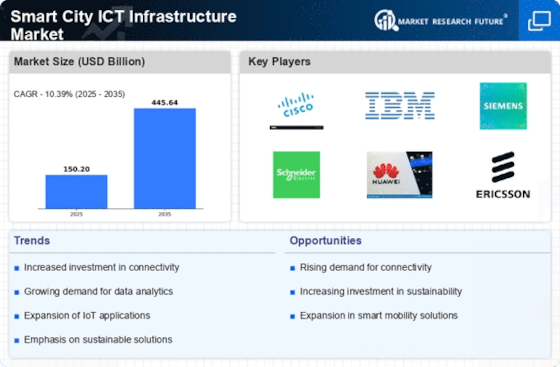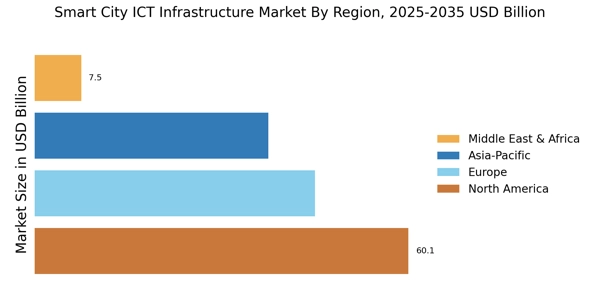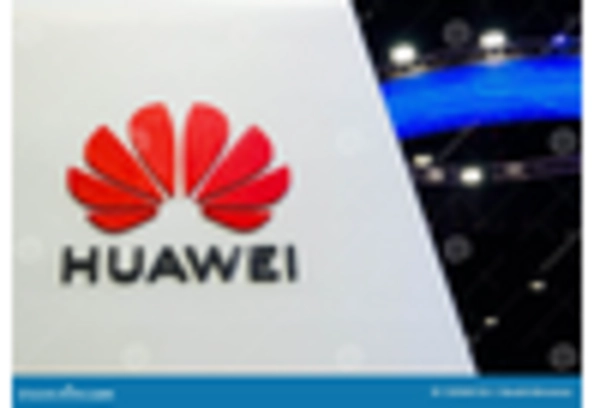Rising Urbanization
The rapid pace of urbanization is a primary driver for the Smart City ICT Infrastructure Market. As more individuals migrate to urban areas, cities face increasing pressure to enhance their infrastructure. This necessitates the implementation of advanced ICT solutions to manage resources efficiently and improve the quality of life for residents. According to recent estimates, urban populations are expected to reach 68% by 2050, which underscores the urgency for smart city initiatives. The Smart City ICT Infrastructure Market is poised to benefit from this trend, as municipalities invest in technologies that facilitate better traffic management, energy distribution, and public safety. Consequently, the demand for integrated ICT systems is likely to surge, propelling market growth.
Focus on Sustainability
The focus on sustainability is emerging as a pivotal driver for the Smart City ICT Infrastructure Market. As environmental concerns gain prominence, cities are increasingly adopting smart technologies to promote sustainable practices. This includes the implementation of energy-efficient systems, smart grids, and waste reduction initiatives. Reports suggest that investments in sustainable urban infrastructure could exceed 200 billion USD by 2025, highlighting the financial commitment to green technologies. The Smart City ICT Infrastructure Market stands to benefit from this trend, as cities seek to reduce their carbon footprints and enhance resource management. Consequently, the integration of sustainable ICT solutions is likely to become a key focus area for urban planners and policymakers.
Technological Advancements
Technological advancements are significantly influencing the Smart City ICT Infrastructure Market. Innovations in areas such as artificial intelligence, big data analytics, and the Internet of Things (IoT) are transforming how cities operate. These technologies enable real-time data collection and analysis, which is essential for effective urban management. For example, smart traffic systems utilize AI algorithms to optimize traffic flow, reducing congestion and emissions. The market for smart city technologies is projected to grow at a compound annual growth rate of 25% over the next five years, indicating a robust demand for ICT infrastructure. As cities adopt these cutting-edge solutions, the Smart City ICT Infrastructure Market is likely to expand rapidly.
Government Initiatives and Funding
Government initiatives play a crucial role in shaping the Smart City ICT Infrastructure Market. Various governments are increasingly recognizing the importance of smart city projects and are allocating substantial funding to support these initiatives. For instance, numerous countries have established smart city programs aimed at enhancing urban living through technology. In 2023, it was reported that public sector investments in smart city projects reached approximately 100 billion USD, reflecting a growing commitment to modernize urban infrastructure. This financial backing not only accelerates the development of ICT solutions but also encourages private sector participation, fostering innovation and competition within the Smart City ICT Infrastructure Market.
Public Demand for Enhanced Services
Public demand for enhanced services is a significant driver of the Smart City ICT Infrastructure Market. Citizens increasingly expect efficient, reliable, and user-friendly services from their local governments. This expectation has led to a push for smart solutions that improve public transportation, waste management, and emergency services. Surveys indicate that over 70% of urban residents favor the implementation of smart technologies to enhance their quality of life. As municipalities strive to meet these demands, investments in ICT infrastructure become imperative. The Smart City ICT Infrastructure Market is thus positioned to grow as cities prioritize the development of services that cater to the evolving needs of their populations.

















